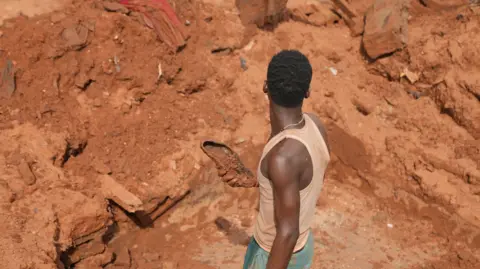The recent flooding disaster in Nigeria has led to a devastating loss of life, with reports confirming that the death toll has tragically surpassed 200 individuals. This calamity struck the northern Nigerian town of Mokwa on Thursday, and the ongoing search and rescue mission continues to reveal the extent of the tragedy. Disturbingly, an estimated 500 residents remain unaccounted for, sparking concerns about their fate as the days go by.
Local officials, including Musa Kimboku, the Deputy Chairman of Mokwa Local Government, have indicated that rescue operations have been suspended since there is little hope remaining for finding survivors. This decision has added to the pain and despair felt by the community, as many are left grappling with the enormity of their losses. Eyewitness accounts from locals describe horrific scenes of destruction as the floodwaters surged through their homes, obliterating everything in their path.
The floods are described as the worst the area has seen in six decades, triggered by an intense period of torrential rainfall. Towns such as Tiffin Maza and Anguwan Hausawa have been particularly hard hit, with entire neighborhoods swamped, submerging homes and endangering lives. As the grim search continues, the local authorities are also taking preventive measures to mitigate the risk of disease outbreaks resulting from decomposing bodies buried beneath the floodwaters, as highlighted by the district head, Muhammadu Aliyu.
In the wake of this catastrophe, residents have shared their harrowing stories of survival and loss. Adamu Yusuf, one of the survivors, recounted how he helplessly watched as the flood swept away his wife and newborn baby. He expressed his disbelief at the situation, crediting his ability to swim for his own survival. John Doe, another affected individual, reported substantial financial losses due to the flooding, losing approximately $1,500 that he earned from selling his farm produce the day before. His story reflects the financial devastation many locals are experiencing alongside their emotional grief.
Recognizing the urgent need for assistance, the National Emergency Management Agency (NEMA) has begun implementing measures to provide relief packages to the victims of the disaster. They have also reported considerable damage to infrastructure, including roads and bridges, which poses additional challenges for the local economy and hampers rescue efforts. Meanwhile, the Nigerian Red Cross has described the flooding situation as one of significant loss of life and widespread distress, which echoes the fears and struggles of affected communities.
Flooding is a recurring issue during Nigeria’s rainy season, which typically lasts from April to October. Previous years have witnessed similar tragedies; in 2024, heavy rainfall resulted in considerable flooding that displaced numerous families, while the 2022 rains caused over 600 fatalities and sent 1.3 million people fleeing from their homes. The current flooding in Mokwa, however, marks an extreme escalation of this ongoing crisis, igniting urgent discussions about the need for better urban planning and disaster response in flood-prone areas.
Moving forward, as the rescue and recovery efforts continue, the community faces immense challenges not only related to loss of life and infrastructure but also concerning public health and economic stability. Local authorities, aid organizations, and community leaders are tasked with ensuring that support and relief reach those affected swiftly and efficiently in the face of overwhelming despair. The heartbreaking stories from Mokwa serve as a reminder of the human cost of natural disasters and the urgent need for concerted efforts to address climate-related challenges affecting vulnerable populations across Nigeria.



